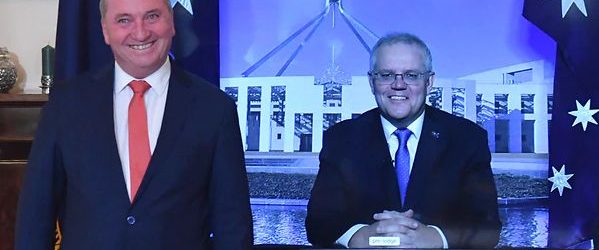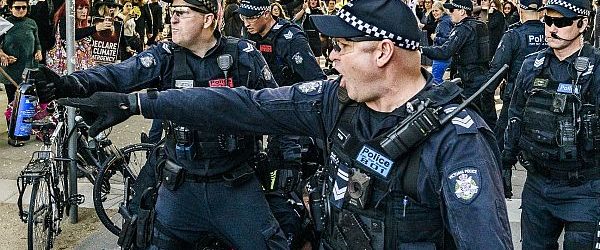My parents named their only child after one of Shakespeare’s most famous cross-dressers. One might have imagined, therefore, that they’d have been less taken aback to learn of my gradual slide into ambiguous Kinsey Scale territory. As it was, they were deeply surprised. Most people are.
For all that Australian society is gradually becoming more progressive and informed about gender and sexuality, bisexuality remains a complex identity to have – and to have to explain to others. This is especially the case in our sociopolitical climate following the 2017 marriage equality postal survey. Despite the survey’s ultimately positive outcome (in the sense that a ‘yes’ vote won, if nothing else), the debate surrounding it intensified public anxiety around queer identities and lives. Just because we’re now in 2018 and same-sex marriage is legal, it doesn’t mean this anxiety is erased or that all the fuel thrown onto it last year has burnt away.
Yet I don’t write this article to revisit 2017: there’s little point casting stones into what perspicacious commentators have already rendered a rock quarry. Rather, if I am writing, it is to unpack specific challenges experienced by and levelled at bisexual people. These challenges merit addressing not only in themselves, but also because they highlight Australia’s continued conservativism towards queer identities more broadly.
When I told my parents that my dating pool was not segregated into gendered swimming lanes, I wasn’t initially believed – I don’t fit queer stereotypes. I’m too quiet for parades; not edgy enough for asymmetrical fringes. Nevertheless, once they realised I was being serious, my parents told me that they loved me. It was all somewhat uncomfortable, as talking about sexuality with your parents inevitably is, but it was a largely positive interaction, at least in the moment.
Despite this, however, certain questions and comments keep reappearing, from them and from others. Words are had and hands are wrung.
How can you know? Have you slept with a man? But you’re so feminine! Does dating men make you feel uncomfortable? Maybe you just haven’t met the right one yet?
Such questions are familiar for many bisexual women, especially more feminine ones. Though sometimes frustratingly incredulous, they’re not usually malicious; indeed, they often come from a place of curiosity. Slightly tone-deaf questions, but well-meaning.
The problem is when these questions are imbued with scepticism or – the most condescending and undermining tone of all – concern. Suddenly the questions are insinuations that I don’t know myself; that I am making a grave error; that I am blind at best, and imbalanced at worst.
Statistics show bisexuals already experience poorer mental health and greater anxiety than their heterosexual or homosexual counterparts (less data exists for asexuals, hence their omission here). If we’re to address these issues, therefore, we must consider how our way of discussing bisexuality, even if well-intentioned, may negatively impact bisexual individuals. This is especially true when it comes to discussion of bisexuals in same-sex relationships.
For starters, bisexuals are habitually dismissed as non-existent – a poor foundation on which to build acceptance. As Hera Lindsay Bird summarises in her poem ‘Bisexuality’: ‘They won’t let you out of the closet to get back in again’.
People put bisexuals down. Indeed, they’re put down as gay and in denial if they’re male, or straight and faking queerness if they’re female; either way, assumed penile obsession remains central in this mentality to a degree that would make Freud proud. Yet this ‘pick a side’ mindset only serves to undermine bisexuality’s validity as a real sexual orientation: the whole point is that gender is not a definer or a deal-breaker.
Second, bisexuals often have their identity questioned and dismissed on the basis of stereotypes which link physical presentation with sexuality. These stereotypes are typically dichotomic and based on whether a person’s masculinity, femininity and general presentation ‘matches’ their assigned gender. This means that when these stereotypes are applied, they operate within the flawed straight/gay binary. Where do bisexuals land? No-one knows – the moon, most likely. There are no established bisexual identifiers, even stereotype-based ones, because we have been raised to see and stereotype people in one of two ways. This means, for example, that more feminine-presenting women are presumed straight and more masculine-presenting women are presumed gay.
These assumptions are narrowminded and destructive in their own right, but they become even more destructive when they are translated into how people interact with bisexuals. As a feminine woman who, though somewhat label-averse, is effectively bisexual, I have been repeatedly undermined by comments along the lines of But you’re so feminine/pretty! or But surely you could find a boyfriend! It’s as though society’s whole understanding of the rather simple Latin-derived prefix bi vanishes in a puff – a single puff, mind – of smoke when the prospect of non-heterosexuality enters the room. Ridiculous.
Such comments also underline a third issue: that of perceived waste or poor judgement among bisexual individuals, especially those pursuing same-sex relationships. The notion that a conventionally attractive, feminine woman might be into women is seen as borderline affronting and deceitful, to others as well as herself; people have trouble believing that bisexuals can have their pick of genders and not necessarily choose men. This can entail the But you’re so feminine comment, lurking a mere hop away from What a waste – and whether this is spoken or implied, it hurts every time.
Equality between heterosexuals, homosexuals and everyone in between will not exist until we can accept that same-sex relationships are equal to opposite-sex relationships. They are not the poor alternative; they are not something straight people should ‘let the gays have’ just because the gays can’t help being who they are.
Indeed, the element of choice existent in bisexuality is important to acknowledge, because only in respecting that one might choose a same-sex relationship over an opposite-sex one do we truly accept queer relationships. Otherwise, the acceptance society has of same-sex relationships only extends to allowing them if there is no other option; the ‘if they’re irretrievably gay, just let them be happy’ attitude. This isn’t acceptance: it’s tolerance, and it’s not good enough.
That is why I am writing this article. Because as much as we can congratulate ourselves on having finally achieved marriage equality in this country, the way bisexuals continue to be questioned for their choices reflects an ongoing and pervasive belief that same-sex relationships are still other, still lesser. If Australians still think it’s a shame when a person’s gay, bisexual, or asexual, because they would otherwise have made such a beautiful, wholesome straight person, homophobia is still going strong. People’s responses to bisexuality merely make this homophobia evident: when you effectively do have a choice over whether to pursue a same-sex or an opposite-sex relationship, choosing to pursue a same-sex one is often perceived as radical.
It shouldn’t be.
Bi Visibility Day (aka International Celebrate Bisexuality Day) takes place 23 September each year. Information and event details can be found at the official website.
Image: still from Janelle Monae’s ‘Make me feel’






